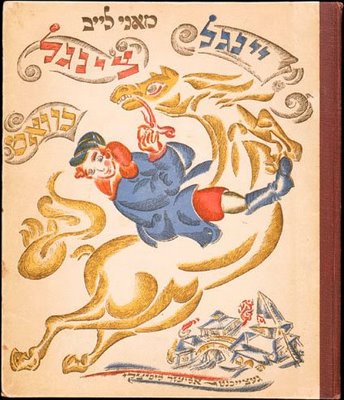Description
The cover of the book "Ingle-Tensel-Khvat" by Mani Leib, designed by the Lissitzky in 1918, is not simply a cover, but a visual declaration of the principles and spirit of the Russian avant-garde. The Lissitzky, an artist whose influence extends not only in visual art, but also in architecture, typography and graphic design, aligns with constructivism, a movement that intended to reinforce the ideals of the new Soviet society through Innovation and functional design.
When observing this cover, the first thing that stands out is the geometric composition that Lissitzky uses. The work is dominated by straight lines and acute angles, creating a feeling of dynamism and rigidity at the same time. The use of basic triangles, rectangles and circles resonates with the constructivist belief that art must be simplified and accessible, moving away from the ornamental and complex forms of the past. The structure of the composition guides the viewer's view through the work, marking a visual rhythm that seems to emulate the cadence of a poem, such as the writings of Mania Leib.
The color in this work deserves a special mention. A limited palette predominates, where black, white and tones of red are integrated into a harmonious set. The choice of these colors is not incidental; Red is associated with communism and revolution, while black and white contrast strongly, highlighting clarity and order. These colors also reflect the functionality and pragmatism of constructivism: there is no place for superfluous.
In terms of typography, the work shows an exceptional ability to integrate the text into the composition, without it seems added or oblivious to visual design. Cyrilic characters are dispersed with mathematical precision, and each letter seems carefully positioned to maximize its visual impact. This is a clear manifestation of the belief of the Lissitzky in which the text and image should not be considered separate entities; Rather, they must join to create a cohesive experience.
NO characters are visualized on this cover, which eliminates any subjective distraction that human figures could cause. The absence of characters allows attention to focus on the interaction between shapes and colors, highlighting the accuracy of the design. This approach in the form of content is a distinctive characteristic of constructivism and reinforces the objective of the Lissitzky to make art a tool at the service of society.
This design is not only a cover for a book, but a work of art itself. It reflects the aspirations of an era in which art looked like an agent of social and political change. The collaboration between the Lissitzky and Mani Leib encapsulates the intersection between literature and visual arts, highlighting how the avant -garde ideals could transcend different means and disciplines to create a synergy that resonated with the values of their time.
In summary, the cover of the book "Ingle-timel-Khvat" by Mani Leib designed by the Lissitzky is a masterful example of the fusion of function and form that characterizes constructivism. It is a visual manifestation of the revolutionary ideals, a geometric structure that vibrates with energy and a use of color and typography that underline the interconnection between all artistic disciplines. The work, as rigorous as poetic, remains a enduring testimony of the Lissitzky's ability to transform graphic design into a pure and significant form.
KUADROS ©, a famous paint on your wall.
Hand-made oil painting reproductions, with the quality of professional artists and the distinctive seal of KUADROS ©.
Art reproduction service with satisfaction guarantee. If you are not completely satisfied with the replica of your painting, we refund your money 100%.

